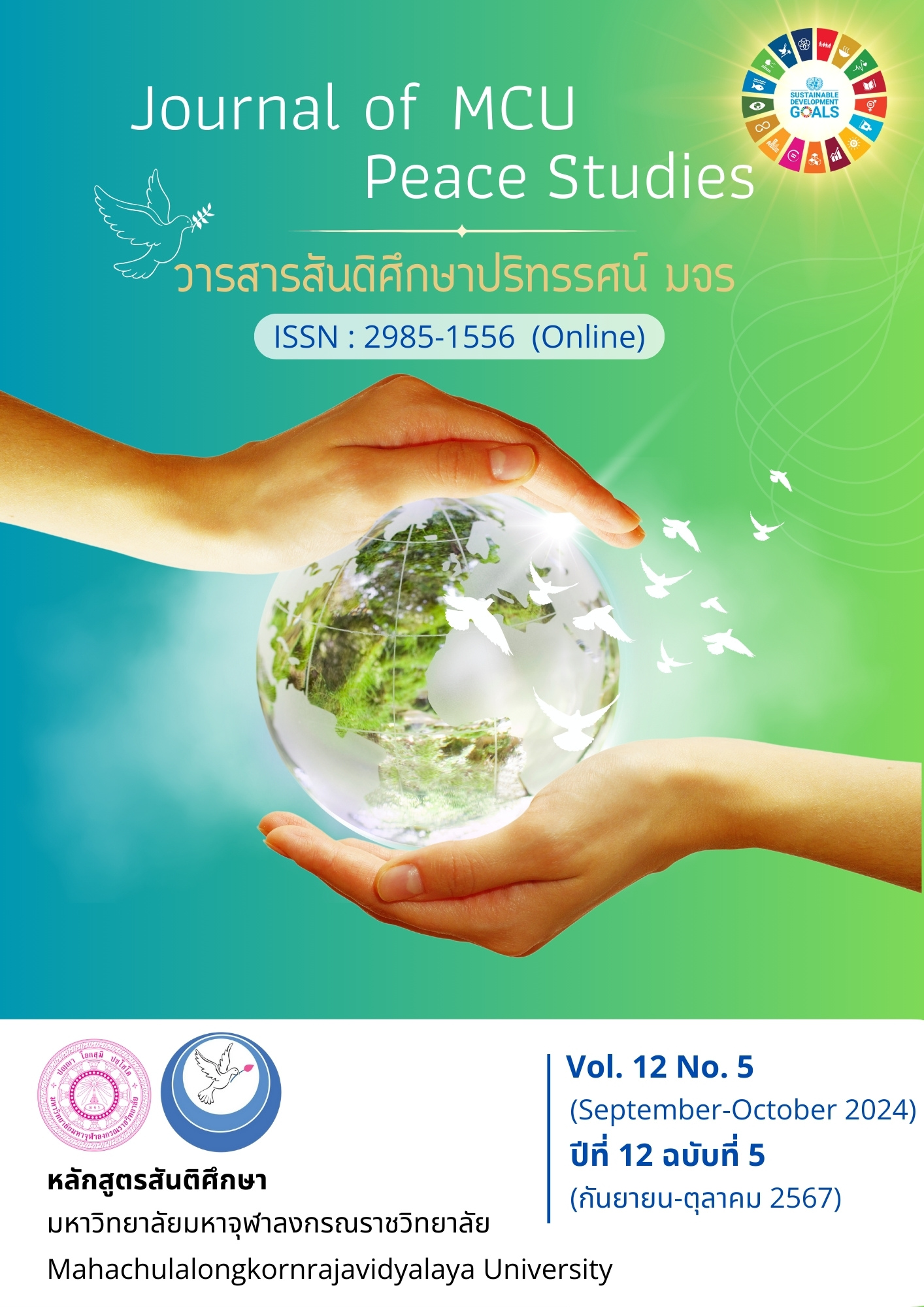รูปแบบการบริหารจัดการชั้นเรียนวิถีใหม่ของโรงเรียนเอกชน สังกัดสำนักงานศึกษาธิการจังหวัดขอนแก่น
Main Article Content
บทคัดย่อ
บทความวิจัยนี้มีวัตถุประสงค์เพื่อ 1) ศึกษาสภาพปัจจุบัน สภาพที่พึงประสงค์ และความต้องการจำเป็น 2) สร้างรูปแบบการบริหารจัดการชั้นเรียนวิถีใหม่ของโรงเรียนเอกชน สังกัดสำนักงานศึกษาธิการจังหวัดขอนแก่น 3) ทดลองใช้รูปแบบการบริหารจัดการชั้นเรียนวิถีใหม่ของโรงเรียนเอกชน สังกัดสำนักงานศึกษาธิการจังหวัดขอนแก่น 4) ประเมินรูปแบบการบริหารจัดการชั้นเรียนวิถีใหม่ของโรงเรียนเอกชน สังกัดสำนักงานศึกษาธิการจังหวัดขอนแก่น กลุ่มตัวอย่างในการศึกษาสภาพปัจจุบัน สภาพที่พึงประสงค์ ได้แก่ ผู้บริหารสถานศึกษาและครู จำนวน 298 คน โดยการสุ่มแบบแบ่งชั้น และกลุ่มผู้ให้ข้อมูลในการศึกษาแนวทางพัฒนา ได้แก่ ผู้บริหารสถานศึกษา และครู จำนวน 6 คน เลือกแบบเจาะจง กลุ่มผู้ให้ข้อมูล ได้แก่ ผู้ทรงคุณวุฒิ จำนวน 9 คน เลือกแบบเจาะจง กลุ่มเป้าหมายในการทดลองใช้ ได้แก่ ผู้บริหารสถานศึกษาและครู จำนวน 20 คน โดยสมัครใจ กลุ่มผู้ให้ข้อมูลในการประเมิน ได้แก่ ผู้บริหารสถานศึกษาและครู จำนวน 30 คน เลือกแบบเจาะจง เครื่องมือที่ใช้ ได้แก่ แบบสอบถามสภาพปัจจุบันสภาพที่พึงประสงค์ แบบสัมภาษณ์ ประเด็นการสัมมนาอิงผู้เชี่ยวชาญ แบบสอบถามความเหมาะสมของรูปแบบ แบบทดสอบ แบบสังเกต แบบสอบถามประสิทธิภาพ และแบบสอบถามความพึงพอใจ สถิติที่ใช้ ได้แก่ ร้อยละ ค่าเฉลี่ย ส่วนเบี่ยงเบนมาตรฐาน และค่าความต้องการจำเป็น
ผลการวิจัย พบว่า 1) สภาพปัจจุบัน อยู่ในระดับปานกลาง สภาพที่พึงประสงค์ อยู่ในระดับมากที่สุด และความต้องการจำเป็นลำดับที่ 1 ด้านการเรียนการสอน 2) รูปแบบฯ ประกอบด้วย 5 ส่วน ได้แก่ (1) หลักการและวัตถุประสงค์ (2) วิธีการดำเนินการ (3) กลไกการดำเนินการ (4) แนวทางการพัฒนา และ (5) เงื่อนไขความสำเร็จ มีความเหมาะสมอยู่ในระดับมากที่สุด 3) คะแนนประเมินความรู้หลังการเข้าร่วมพัฒนา สูงกว่าคะแนนประเมินความรู้ก่อนการเข้าร่วมพัฒนา ระดับพฤติกรรมหลังการพัฒนาสูงกว่าก่อนการพัฒนา 4) ความเหมาะสมและด้านความเป็นประโยชน์ของรูปแบบฯ อยู่ในระดับมากที่สุด และระดับ ความพึงพอใจอยู่ในระดับมากที่สุด
Article Details

อนุญาตภายใต้เงื่อนไข Creative Commons Attribution-NonCommercial-NoDerivatives 4.0 International License.
ทัศนะและความคิดเห็นที่ปรากฏในบทความในวารสาร ถือเป็นความรับผิดชอบของผู้เขียนบทความนั้น และไม่ถือเป็นทัศนะและความรับผิดชอบของกองบรรณาธิการ ยินยอมว่าบทความเป็นลิขสิทธิ์ของวารสาร
เอกสารอ้างอิง
Bull, Sh., & Solity, J. (1987). Classroom Management: Principles to Practice. New York: Croom Helm.
Bunprasert, U. (2009). Research on Educational Administration. (2nd ed.). Bangkok: Dhurakij Pundit University.
Burden, P. R. (2003). Classroom Management: Creating a Successful Learning Community (2nd ed.). New York: Wiley.
Cipani, E. (2004). Punishment on Trial: A Resource Guide to Child Discipline. Reno, NV: Context Press.
Courtney, D. P. (2009). Student Teacher and Classroom Management: The Development of Strategy’s. MI, USA: Proquest LLC.
Duangchuen, D. (2020). Educational Management Accepting the New Normal after the COVID-19 Crisis. Journal of Management Arts, 4 (3), 783-795.
Gandolfi, E., Ferdig, R. E., & Kratcoski, A. (2021). A New Educational Normal an Intersectionality-led Exploration of Education (Learning Technologies, and Diversity During COVID-19. Technology in Society, Elsevier, 66, 101637.
Gilpatrick, R. S. H. (2010). Classroom Management Strategies and Behavioral Interventions to Support Academic Achievement. Minnesota: Walden University.
Haseesuk, S. (2022). Teaching and Learning Management Model Based on the Concept of Understanding, Access and Development of Ban Muang Kae School under the Buriram Primary Educational Service Area Office, Area 4. Journal of Social Innovation and Mass Communication Technology, 5(2), 1-10.
Jenson, E. (1998). Introduction to Brain Compatible Learning. Del Mar, CA: Turning Poit.
Joyce, M., Fisher, J., & Hoover, G. (2003). The Key Elements of Classroom Management. Alexandria, VA: Association for supervision and Curriculum Development.
Jungsuthiwong, S. (2017). New Classroom Management Model Schools under Local Administrative Organizations in the Northeastern Region. (Doctoral Dissertation). Sakon Nakhon Rajabhat University. Sakon Nakhon.
Keevep, P. J. (1988). Educational Research, Methodology and Measurement International Handbook. Oxford: Pergamon Press.
Khaemmanee, T. (2007). Teaching Science: Knowledge for Organizing an Effective Learning Process. (7th ed.). Bangkok: Chulalongkorn University Press.
Khanitharangkun, S. (2008). Classroom Management of Professional Teachers. Journal of Education Loei Rajabhat University, 1(2), 1-19.
McKown, C., & Weinstein, R. S. (2003). The Development and Consequences of Stereotype Consciousness in Middle Childhood. Child Development, 74(2), 498-515.
Ministry of Education. (2010). Basic Education Core Curriculum 2008. (3rd ed.). Bangkok: Agricultural Cooperative Assembly Press of Thailand.
Office of the Private Education Commission. (2022). Annual Report 2022. Bangkok: Office of the Private Education Commission.
Owen, C. (2009). Room for Change: Decision Made by K-3 Teachers in Designing Classrooms. MI, USA: Proques LLC.
Runcharoen, T. (2003). School Administration in the Era of Educational Reform. Bangkok: Khaofang.
Sripila, A. (2020). Classroom Management Model with Student Participation of Secondary Schools in the Northeastern Region. (Doctoral Dissertation). Maha Sarakham University. Maha Sarakham.


